EHR7006: Future of Work - Impact of Automation on Emerging Economies
VerifiedAdded on 2023/01/17
|13
|3266
|80
Essay
AI Summary
This economics essay examines the profound impact of automation and offshoring on emerging and developing economies, with a specific focus on China, India, Bangladesh, and the Philippines. The essay begins by highlighting the historical context of technological advancements and industrial revolutions, emphasizing the challenges posed by automation, including job displacement and the need for workforce reskilling. It explores how automation is increasingly replacing human labor, particularly in emerging economies, and discusses the potential negative consequences, such as increased unemployment and social unrest. The essay then delves into the concepts of offshoring and outsourcing, detailing how these practices have benefited emerging and developing countries, while also acknowledging the shift towards automation and its implications for these economies. The core argument centers on the crucial role of governments and businesses in re-skilling and up-skilling their populations to mitigate the adverse economic and social effects of automation. The essay presents evidence of automation's increasing prevalence across various industries, including IT and business process outsourcing, and analyzes the potential for 'onshoring' of jobs back to developed countries. It also examines the potential of automation to create new jobs and increase performance, while highlighting the importance of adaptability, creativity, and communication skills in the future workforce. The essay concludes by emphasizing the need for strategic policies and training programs that address the specific skill gaps created by automation and prepare the workforce for the evolving demands of the global economy.

ECONOMICS1
Future of work
By (Name)
Course
Instructor’s Name
Institutional Affiliation
The City and State
The Date
Future of work
By (Name)
Course
Instructor’s Name
Institutional Affiliation
The City and State
The Date
Paraphrase This Document
Need a fresh take? Get an instant paraphrase of this document with our AI Paraphraser
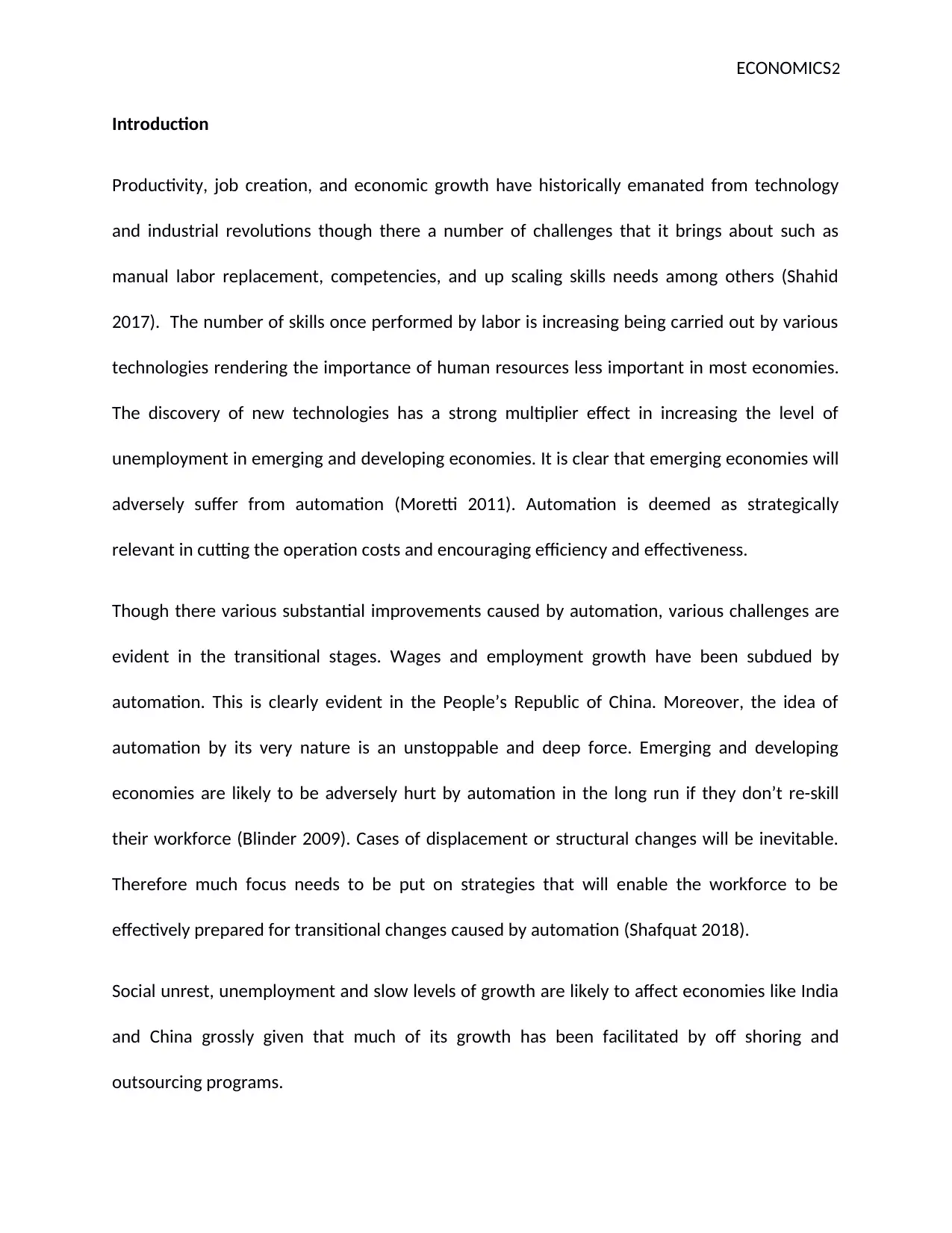
ECONOMICS2
Introduction
Productivity, job creation, and economic growth have historically emanated from technology
and industrial revolutions though there a number of challenges that it brings about such as
manual labor replacement, competencies, and up scaling skills needs among others (Shahid
2017). The number of skills once performed by labor is increasing being carried out by various
technologies rendering the importance of human resources less important in most economies.
The discovery of new technologies has a strong multiplier effect in increasing the level of
unemployment in emerging and developing economies. It is clear that emerging economies will
adversely suffer from automation (Moretti 2011). Automation is deemed as strategically
relevant in cutting the operation costs and encouraging efficiency and effectiveness.
Though there various substantial improvements caused by automation, various challenges are
evident in the transitional stages. Wages and employment growth have been subdued by
automation. This is clearly evident in the People’s Republic of China. Moreover, the idea of
automation by its very nature is an unstoppable and deep force. Emerging and developing
economies are likely to be adversely hurt by automation in the long run if they don’t re-skill
their workforce (Blinder 2009). Cases of displacement or structural changes will be inevitable.
Therefore much focus needs to be put on strategies that will enable the workforce to be
effectively prepared for transitional changes caused by automation (Shafquat 2018).
Social unrest, unemployment and slow levels of growth are likely to affect economies like India
and China grossly given that much of its growth has been facilitated by off shoring and
outsourcing programs.
Introduction
Productivity, job creation, and economic growth have historically emanated from technology
and industrial revolutions though there a number of challenges that it brings about such as
manual labor replacement, competencies, and up scaling skills needs among others (Shahid
2017). The number of skills once performed by labor is increasing being carried out by various
technologies rendering the importance of human resources less important in most economies.
The discovery of new technologies has a strong multiplier effect in increasing the level of
unemployment in emerging and developing economies. It is clear that emerging economies will
adversely suffer from automation (Moretti 2011). Automation is deemed as strategically
relevant in cutting the operation costs and encouraging efficiency and effectiveness.
Though there various substantial improvements caused by automation, various challenges are
evident in the transitional stages. Wages and employment growth have been subdued by
automation. This is clearly evident in the People’s Republic of China. Moreover, the idea of
automation by its very nature is an unstoppable and deep force. Emerging and developing
economies are likely to be adversely hurt by automation in the long run if they don’t re-skill
their workforce (Blinder 2009). Cases of displacement or structural changes will be inevitable.
Therefore much focus needs to be put on strategies that will enable the workforce to be
effectively prepared for transitional changes caused by automation (Shafquat 2018).
Social unrest, unemployment and slow levels of growth are likely to affect economies like India
and China grossly given that much of its growth has been facilitated by off shoring and
outsourcing programs.
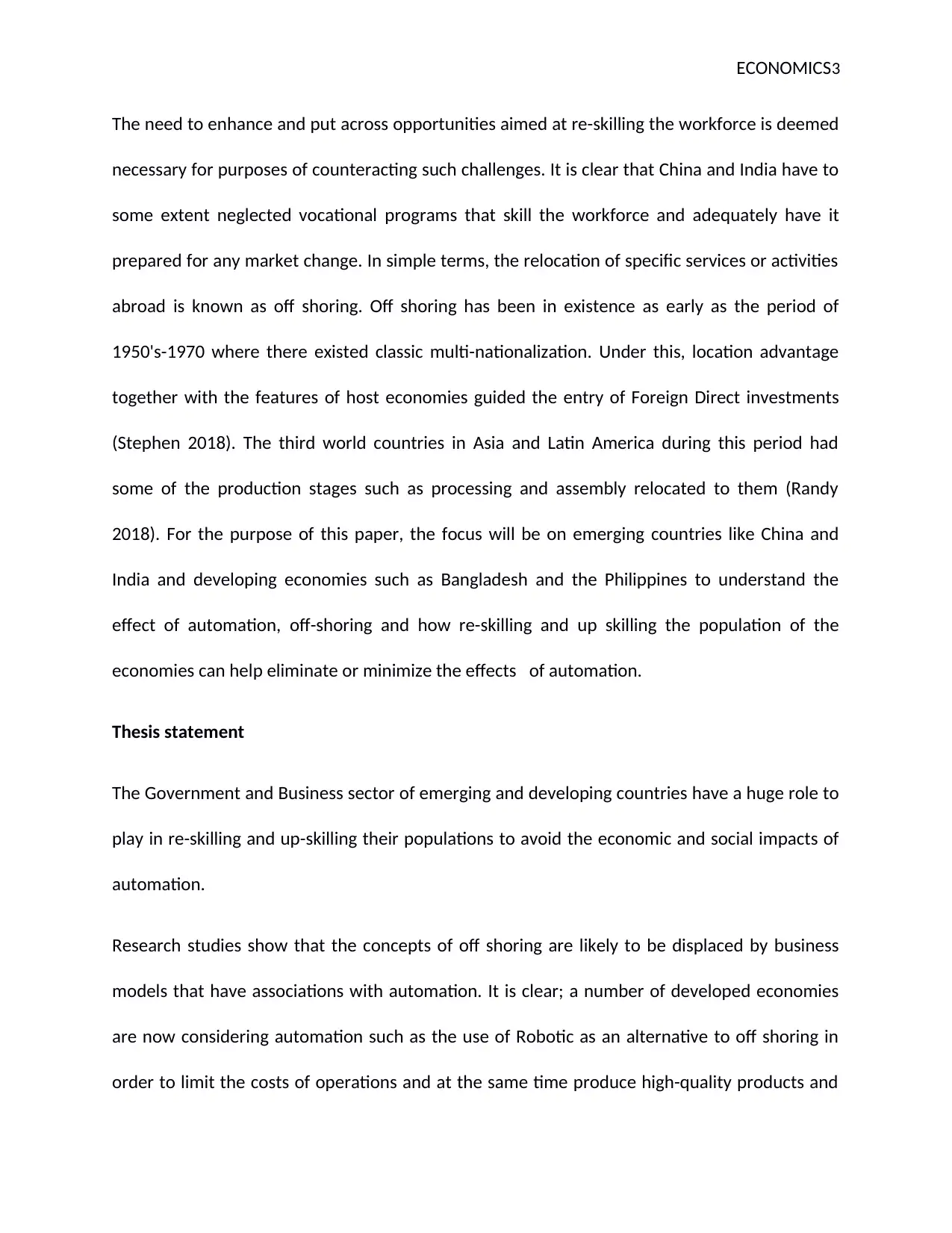
ECONOMICS3
The need to enhance and put across opportunities aimed at re-skilling the workforce is deemed
necessary for purposes of counteracting such challenges. It is clear that China and India have to
some extent neglected vocational programs that skill the workforce and adequately have it
prepared for any market change. In simple terms, the relocation of specific services or activities
abroad is known as off shoring. Off shoring has been in existence as early as the period of
1950's-1970 where there existed classic multi-nationalization. Under this, location advantage
together with the features of host economies guided the entry of Foreign Direct investments
(Stephen 2018). The third world countries in Asia and Latin America during this period had
some of the production stages such as processing and assembly relocated to them (Randy
2018). For the purpose of this paper, the focus will be on emerging countries like China and
India and developing economies such as Bangladesh and the Philippines to understand the
effect of automation, off-shoring and how re-skilling and up skilling the population of the
economies can help eliminate or minimize the effects of automation.
Thesis statement
The Government and Business sector of emerging and developing countries have a huge role to
play in re-skilling and up-skilling their populations to avoid the economic and social impacts of
automation.
Research studies show that the concepts of off shoring are likely to be displaced by business
models that have associations with automation. It is clear; a number of developed economies
are now considering automation such as the use of Robotic as an alternative to off shoring in
order to limit the costs of operations and at the same time produce high-quality products and
The need to enhance and put across opportunities aimed at re-skilling the workforce is deemed
necessary for purposes of counteracting such challenges. It is clear that China and India have to
some extent neglected vocational programs that skill the workforce and adequately have it
prepared for any market change. In simple terms, the relocation of specific services or activities
abroad is known as off shoring. Off shoring has been in existence as early as the period of
1950's-1970 where there existed classic multi-nationalization. Under this, location advantage
together with the features of host economies guided the entry of Foreign Direct investments
(Stephen 2018). The third world countries in Asia and Latin America during this period had
some of the production stages such as processing and assembly relocated to them (Randy
2018). For the purpose of this paper, the focus will be on emerging countries like China and
India and developing economies such as Bangladesh and the Philippines to understand the
effect of automation, off-shoring and how re-skilling and up skilling the population of the
economies can help eliminate or minimize the effects of automation.
Thesis statement
The Government and Business sector of emerging and developing countries have a huge role to
play in re-skilling and up-skilling their populations to avoid the economic and social impacts of
automation.
Research studies show that the concepts of off shoring are likely to be displaced by business
models that have associations with automation. It is clear; a number of developed economies
are now considering automation such as the use of Robotic as an alternative to off shoring in
order to limit the costs of operations and at the same time produce high-quality products and
⊘ This is a preview!⊘
Do you want full access?
Subscribe today to unlock all pages.

Trusted by 1+ million students worldwide
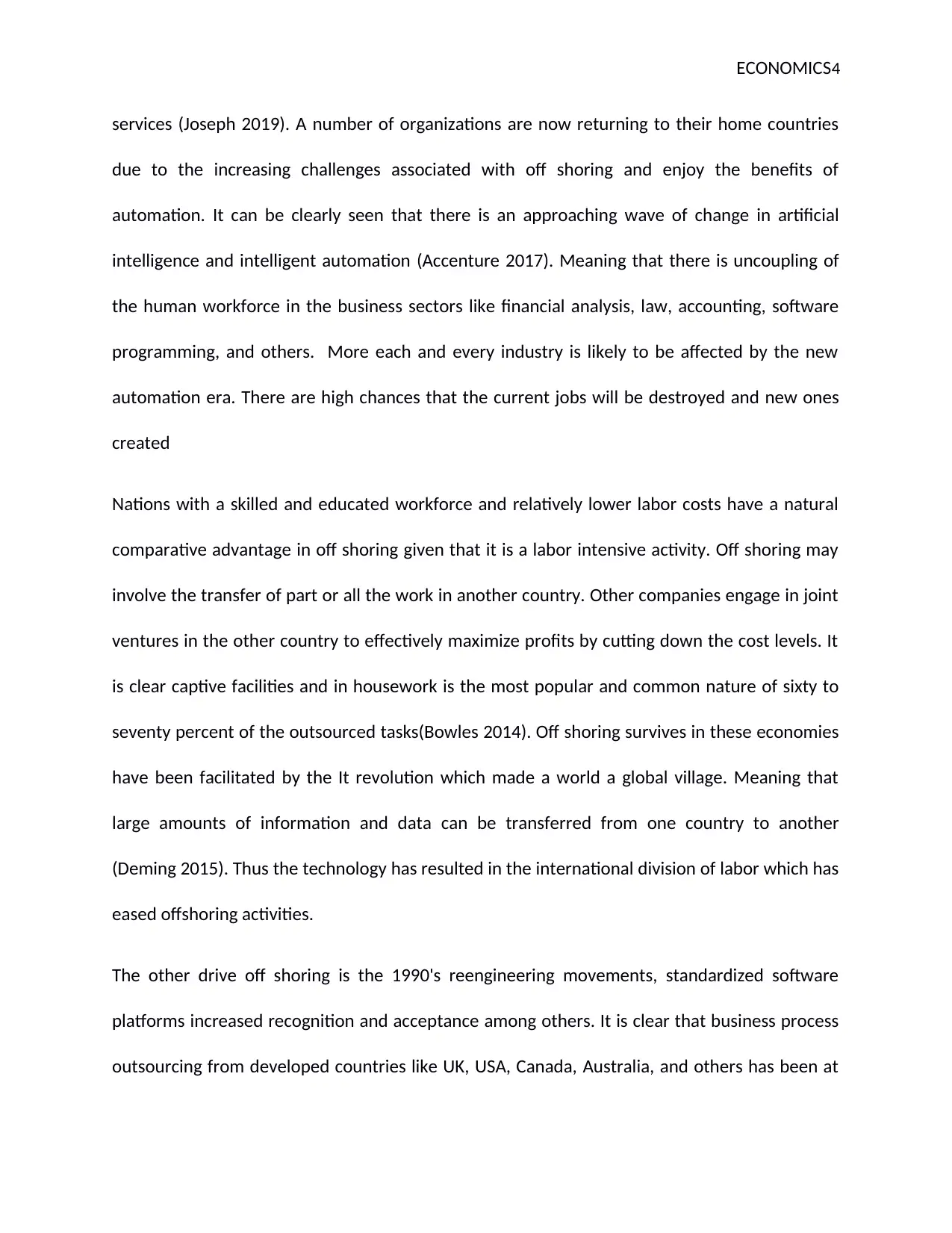
ECONOMICS4
services (Joseph 2019). A number of organizations are now returning to their home countries
due to the increasing challenges associated with off shoring and enjoy the benefits of
automation. It can be clearly seen that there is an approaching wave of change in artificial
intelligence and intelligent automation (Accenture 2017). Meaning that there is uncoupling of
the human workforce in the business sectors like financial analysis, law, accounting, software
programming, and others. More each and every industry is likely to be affected by the new
automation era. There are high chances that the current jobs will be destroyed and new ones
created
Nations with a skilled and educated workforce and relatively lower labor costs have a natural
comparative advantage in off shoring given that it is a labor intensive activity. Off shoring may
involve the transfer of part or all the work in another country. Other companies engage in joint
ventures in the other country to effectively maximize profits by cutting down the cost levels. It
is clear captive facilities and in housework is the most popular and common nature of sixty to
seventy percent of the outsourced tasks(Bowles 2014). Off shoring survives in these economies
have been facilitated by the It revolution which made a world a global village. Meaning that
large amounts of information and data can be transferred from one country to another
(Deming 2015). Thus the technology has resulted in the international division of labor which has
eased offshoring activities.
The other drive off shoring is the 1990's reengineering movements, standardized software
platforms increased recognition and acceptance among others. It is clear that business process
outsourcing from developed countries like UK, USA, Canada, Australia, and others has been at
services (Joseph 2019). A number of organizations are now returning to their home countries
due to the increasing challenges associated with off shoring and enjoy the benefits of
automation. It can be clearly seen that there is an approaching wave of change in artificial
intelligence and intelligent automation (Accenture 2017). Meaning that there is uncoupling of
the human workforce in the business sectors like financial analysis, law, accounting, software
programming, and others. More each and every industry is likely to be affected by the new
automation era. There are high chances that the current jobs will be destroyed and new ones
created
Nations with a skilled and educated workforce and relatively lower labor costs have a natural
comparative advantage in off shoring given that it is a labor intensive activity. Off shoring may
involve the transfer of part or all the work in another country. Other companies engage in joint
ventures in the other country to effectively maximize profits by cutting down the cost levels. It
is clear captive facilities and in housework is the most popular and common nature of sixty to
seventy percent of the outsourced tasks(Bowles 2014). Off shoring survives in these economies
have been facilitated by the It revolution which made a world a global village. Meaning that
large amounts of information and data can be transferred from one country to another
(Deming 2015). Thus the technology has resulted in the international division of labor which has
eased offshoring activities.
The other drive off shoring is the 1990's reengineering movements, standardized software
platforms increased recognition and acceptance among others. It is clear that business process
outsourcing from developed countries like UK, USA, Canada, Australia, and others has been at
Paraphrase This Document
Need a fresh take? Get an instant paraphrase of this document with our AI Paraphraser
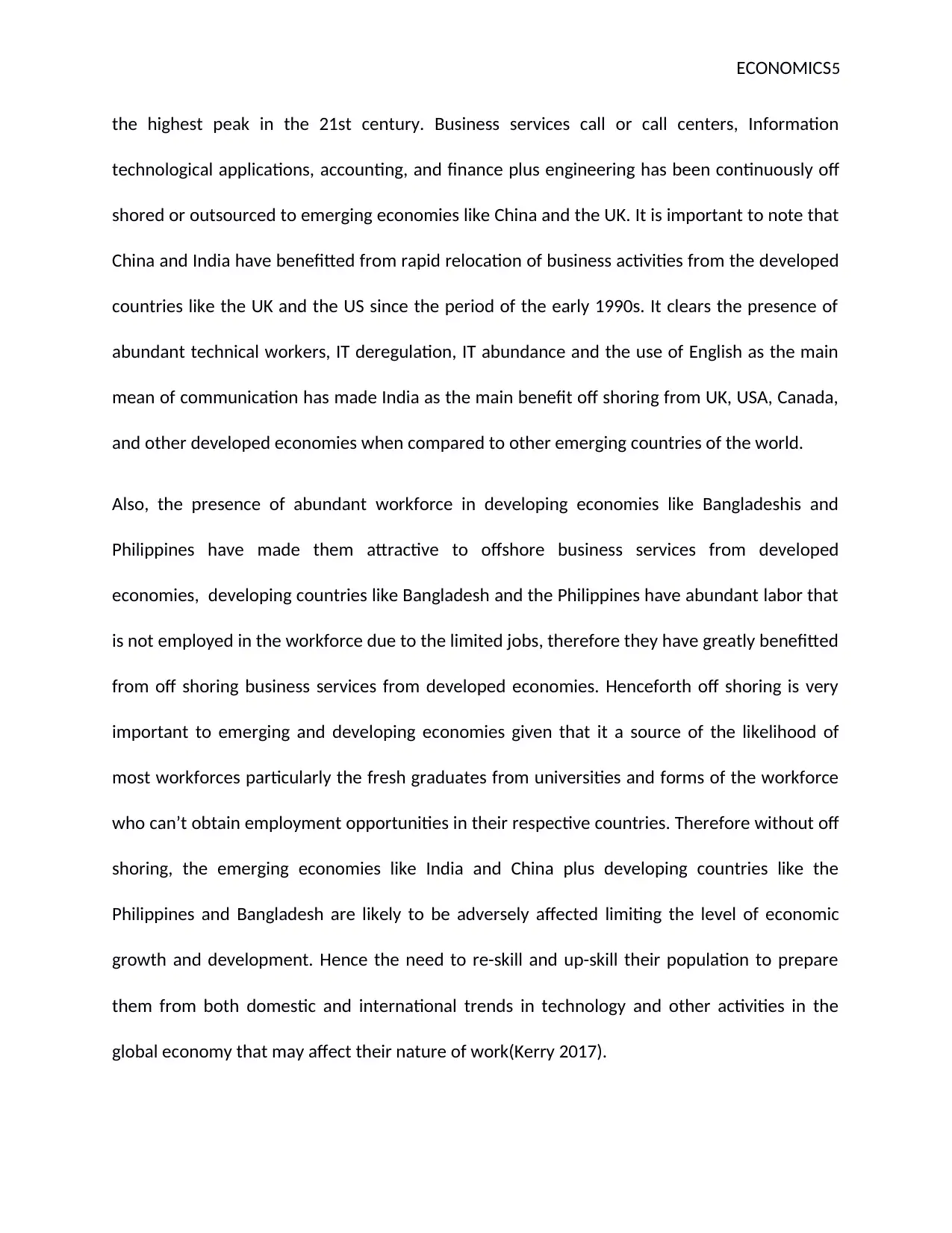
ECONOMICS5
the highest peak in the 21st century. Business services call or call centers, Information
technological applications, accounting, and finance plus engineering has been continuously off
shored or outsourced to emerging economies like China and the UK. It is important to note that
China and India have benefitted from rapid relocation of business activities from the developed
countries like the UK and the US since the period of the early 1990s. It clears the presence of
abundant technical workers, IT deregulation, IT abundance and the use of English as the main
mean of communication has made India as the main benefit off shoring from UK, USA, Canada,
and other developed economies when compared to other emerging countries of the world.
Also, the presence of abundant workforce in developing economies like Bangladeshis and
Philippines have made them attractive to offshore business services from developed
economies, developing countries like Bangladesh and the Philippines have abundant labor that
is not employed in the workforce due to the limited jobs, therefore they have greatly benefitted
from off shoring business services from developed economies. Henceforth off shoring is very
important to emerging and developing economies given that it a source of the likelihood of
most workforces particularly the fresh graduates from universities and forms of the workforce
who can’t obtain employment opportunities in their respective countries. Therefore without off
shoring, the emerging economies like India and China plus developing countries like the
Philippines and Bangladesh are likely to be adversely affected limiting the level of economic
growth and development. Hence the need to re-skill and up-skill their population to prepare
them from both domestic and international trends in technology and other activities in the
global economy that may affect their nature of work(Kerry 2017).
the highest peak in the 21st century. Business services call or call centers, Information
technological applications, accounting, and finance plus engineering has been continuously off
shored or outsourced to emerging economies like China and the UK. It is important to note that
China and India have benefitted from rapid relocation of business activities from the developed
countries like the UK and the US since the period of the early 1990s. It clears the presence of
abundant technical workers, IT deregulation, IT abundance and the use of English as the main
mean of communication has made India as the main benefit off shoring from UK, USA, Canada,
and other developed economies when compared to other emerging countries of the world.
Also, the presence of abundant workforce in developing economies like Bangladeshis and
Philippines have made them attractive to offshore business services from developed
economies, developing countries like Bangladesh and the Philippines have abundant labor that
is not employed in the workforce due to the limited jobs, therefore they have greatly benefitted
from off shoring business services from developed economies. Henceforth off shoring is very
important to emerging and developing economies given that it a source of the likelihood of
most workforces particularly the fresh graduates from universities and forms of the workforce
who can’t obtain employment opportunities in their respective countries. Therefore without off
shoring, the emerging economies like India and China plus developing countries like the
Philippines and Bangladesh are likely to be adversely affected limiting the level of economic
growth and development. Hence the need to re-skill and up-skill their population to prepare
them from both domestic and international trends in technology and other activities in the
global economy that may affect their nature of work(Kerry 2017).
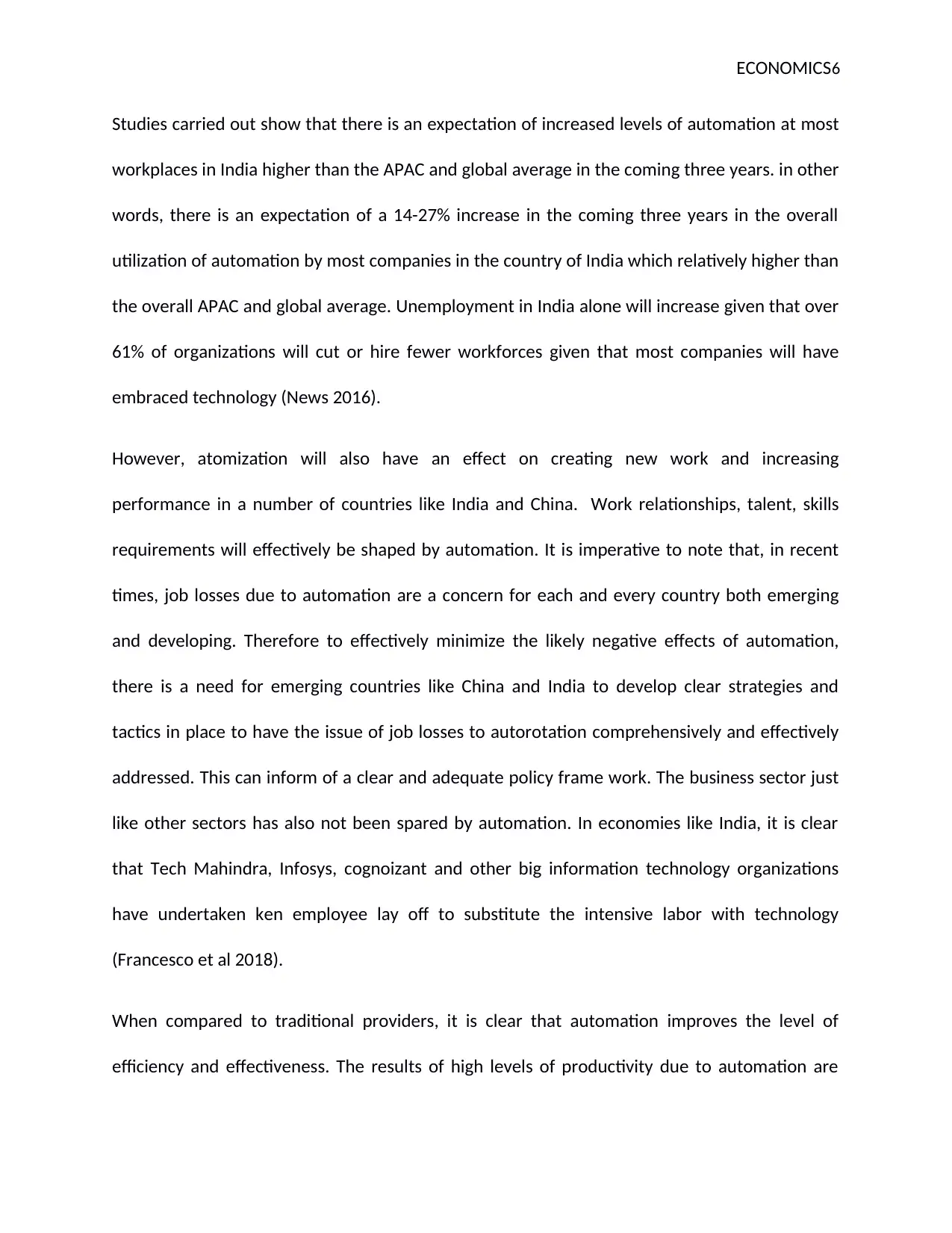
ECONOMICS6
Studies carried out show that there is an expectation of increased levels of automation at most
workplaces in India higher than the APAC and global average in the coming three years. in other
words, there is an expectation of a 14-27% increase in the coming three years in the overall
utilization of automation by most companies in the country of India which relatively higher than
the overall APAC and global average. Unemployment in India alone will increase given that over
61% of organizations will cut or hire fewer workforces given that most companies will have
embraced technology (News 2016).
However, atomization will also have an effect on creating new work and increasing
performance in a number of countries like India and China. Work relationships, talent, skills
requirements will effectively be shaped by automation. It is imperative to note that, in recent
times, job losses due to automation are a concern for each and every country both emerging
and developing. Therefore to effectively minimize the likely negative effects of automation,
there is a need for emerging countries like China and India to develop clear strategies and
tactics in place to have the issue of job losses to autorotation comprehensively and effectively
addressed. This can inform of a clear and adequate policy frame work. The business sector just
like other sectors has also not been spared by automation. In economies like India, it is clear
that Tech Mahindra, Infosys, cognoizant and other big information technology organizations
have undertaken ken employee lay off to substitute the intensive labor with technology
(Francesco et al 2018).
When compared to traditional providers, it is clear that automation improves the level of
efficiency and effectiveness. The results of high levels of productivity due to automation are
Studies carried out show that there is an expectation of increased levels of automation at most
workplaces in India higher than the APAC and global average in the coming three years. in other
words, there is an expectation of a 14-27% increase in the coming three years in the overall
utilization of automation by most companies in the country of India which relatively higher than
the overall APAC and global average. Unemployment in India alone will increase given that over
61% of organizations will cut or hire fewer workforces given that most companies will have
embraced technology (News 2016).
However, atomization will also have an effect on creating new work and increasing
performance in a number of countries like India and China. Work relationships, talent, skills
requirements will effectively be shaped by automation. It is imperative to note that, in recent
times, job losses due to automation are a concern for each and every country both emerging
and developing. Therefore to effectively minimize the likely negative effects of automation,
there is a need for emerging countries like China and India to develop clear strategies and
tactics in place to have the issue of job losses to autorotation comprehensively and effectively
addressed. This can inform of a clear and adequate policy frame work. The business sector just
like other sectors has also not been spared by automation. In economies like India, it is clear
that Tech Mahindra, Infosys, cognoizant and other big information technology organizations
have undertaken ken employee lay off to substitute the intensive labor with technology
(Francesco et al 2018).
When compared to traditional providers, it is clear that automation improves the level of
efficiency and effectiveness. The results of high levels of productivity due to automation are
⊘ This is a preview!⊘
Do you want full access?
Subscribe today to unlock all pages.

Trusted by 1+ million students worldwide
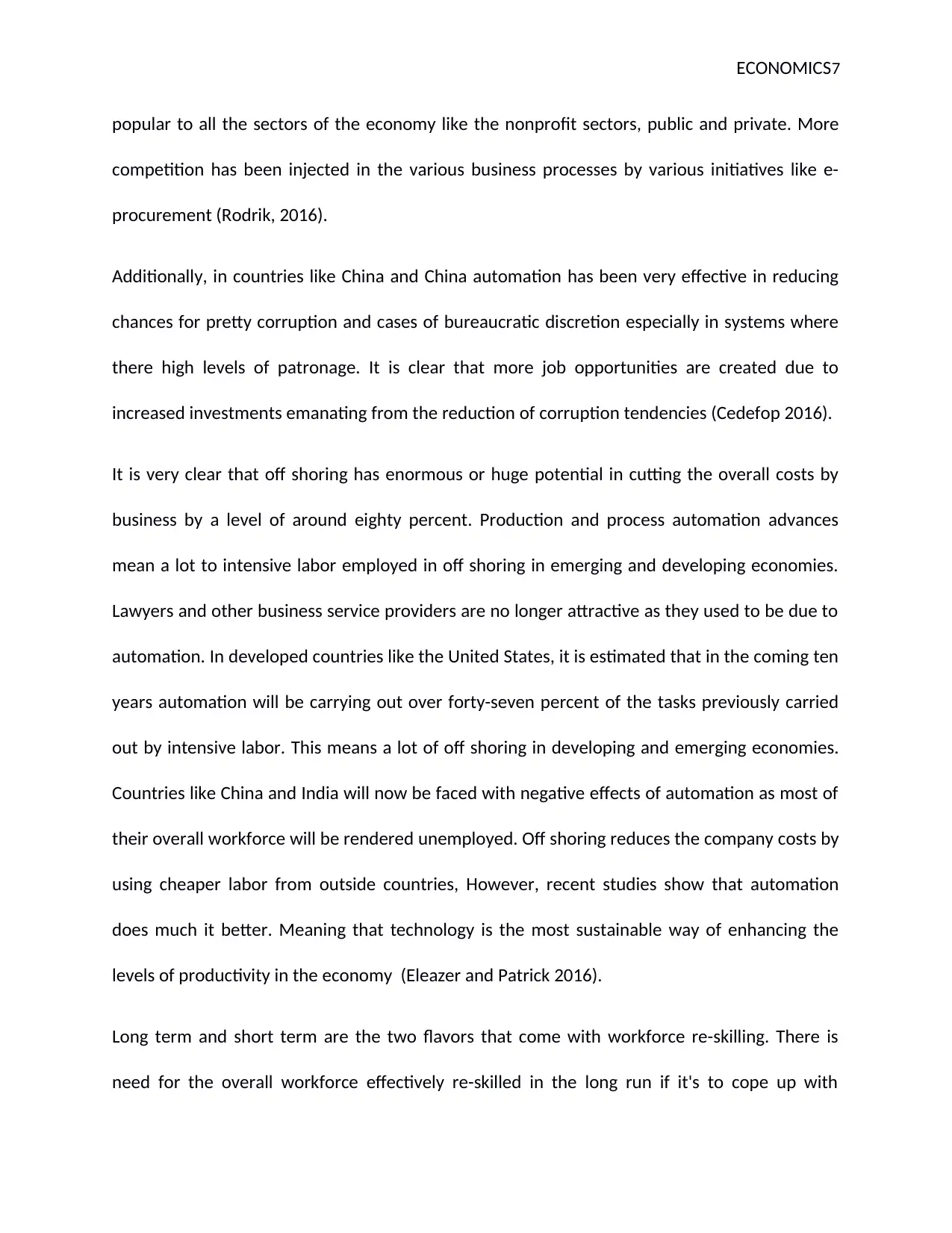
ECONOMICS7
popular to all the sectors of the economy like the nonprofit sectors, public and private. More
competition has been injected in the various business processes by various initiatives like e-
procurement (Rodrik, 2016).
Additionally, in countries like China and China automation has been very effective in reducing
chances for pretty corruption and cases of bureaucratic discretion especially in systems where
there high levels of patronage. It is clear that more job opportunities are created due to
increased investments emanating from the reduction of corruption tendencies (Cedefop 2016).
It is very clear that off shoring has enormous or huge potential in cutting the overall costs by
business by a level of around eighty percent. Production and process automation advances
mean a lot to intensive labor employed in off shoring in emerging and developing economies.
Lawyers and other business service providers are no longer attractive as they used to be due to
automation. In developed countries like the United States, it is estimated that in the coming ten
years automation will be carrying out over forty-seven percent of the tasks previously carried
out by intensive labor. This means a lot of off shoring in developing and emerging economies.
Countries like China and India will now be faced with negative effects of automation as most of
their overall workforce will be rendered unemployed. Off shoring reduces the company costs by
using cheaper labor from outside countries, However, recent studies show that automation
does much it better. Meaning that technology is the most sustainable way of enhancing the
levels of productivity in the economy (Eleazer and Patrick 2016).
Long term and short term are the two flavors that come with workforce re-skilling. There is
need for the overall workforce effectively re-skilled in the long run if it's to cope up with
popular to all the sectors of the economy like the nonprofit sectors, public and private. More
competition has been injected in the various business processes by various initiatives like e-
procurement (Rodrik, 2016).
Additionally, in countries like China and China automation has been very effective in reducing
chances for pretty corruption and cases of bureaucratic discretion especially in systems where
there high levels of patronage. It is clear that more job opportunities are created due to
increased investments emanating from the reduction of corruption tendencies (Cedefop 2016).
It is very clear that off shoring has enormous or huge potential in cutting the overall costs by
business by a level of around eighty percent. Production and process automation advances
mean a lot to intensive labor employed in off shoring in emerging and developing economies.
Lawyers and other business service providers are no longer attractive as they used to be due to
automation. In developed countries like the United States, it is estimated that in the coming ten
years automation will be carrying out over forty-seven percent of the tasks previously carried
out by intensive labor. This means a lot of off shoring in developing and emerging economies.
Countries like China and India will now be faced with negative effects of automation as most of
their overall workforce will be rendered unemployed. Off shoring reduces the company costs by
using cheaper labor from outside countries, However, recent studies show that automation
does much it better. Meaning that technology is the most sustainable way of enhancing the
levels of productivity in the economy (Eleazer and Patrick 2016).
Long term and short term are the two flavors that come with workforce re-skilling. There is
need for the overall workforce effectively re-skilled in the long run if it's to cope up with
Paraphrase This Document
Need a fresh take? Get an instant paraphrase of this document with our AI Paraphraser
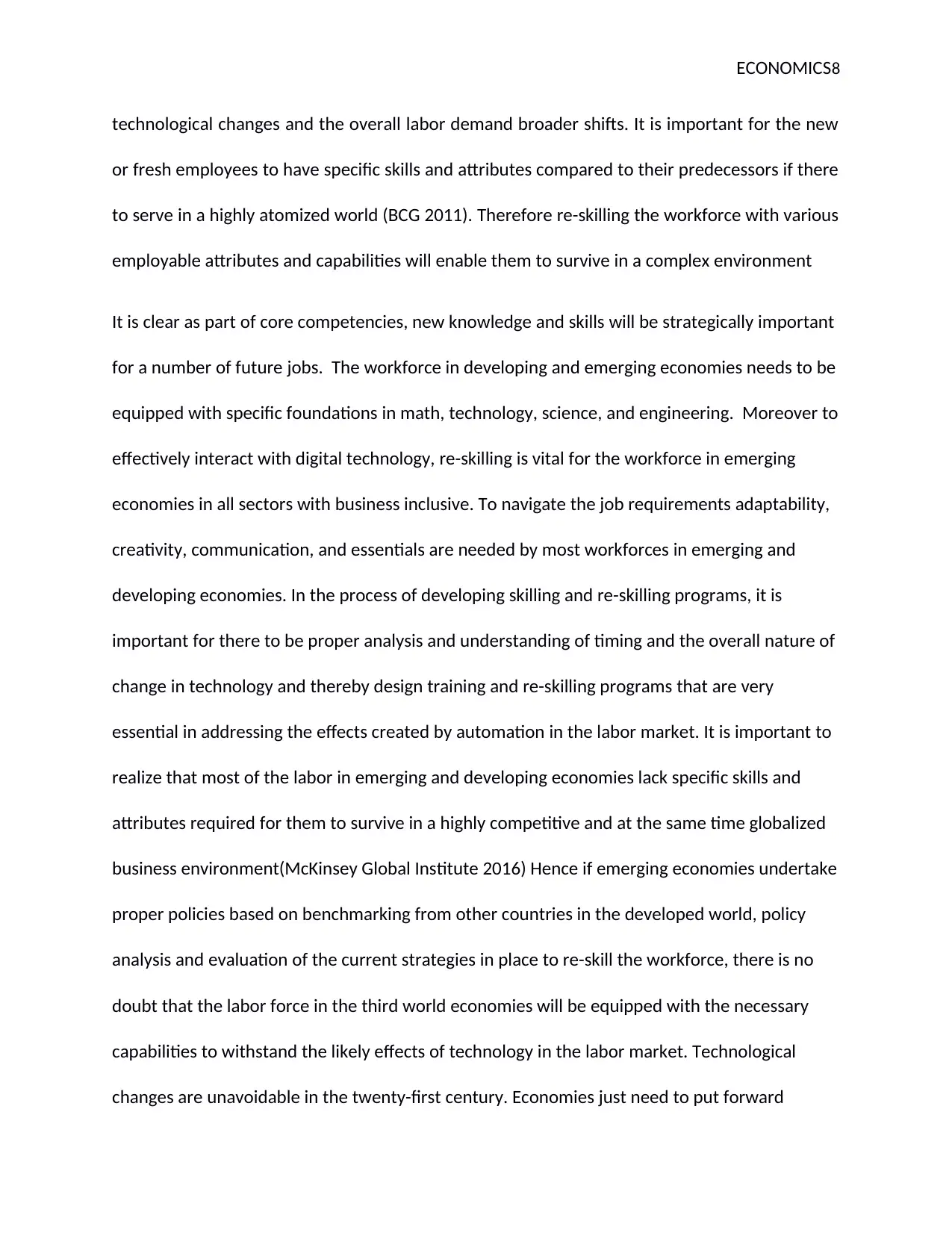
ECONOMICS8
technological changes and the overall labor demand broader shifts. It is important for the new
or fresh employees to have specific skills and attributes compared to their predecessors if there
to serve in a highly atomized world (BCG 2011). Therefore re-skilling the workforce with various
employable attributes and capabilities will enable them to survive in a complex environment
It is clear as part of core competencies, new knowledge and skills will be strategically important
for a number of future jobs. The workforce in developing and emerging economies needs to be
equipped with specific foundations in math, technology, science, and engineering. Moreover to
effectively interact with digital technology, re-skilling is vital for the workforce in emerging
economies in all sectors with business inclusive. To navigate the job requirements adaptability,
creativity, communication, and essentials are needed by most workforces in emerging and
developing economies. In the process of developing skilling and re-skilling programs, it is
important for there to be proper analysis and understanding of timing and the overall nature of
change in technology and thereby design training and re-skilling programs that are very
essential in addressing the effects created by automation in the labor market. It is important to
realize that most of the labor in emerging and developing economies lack specific skills and
attributes required for them to survive in a highly competitive and at the same time globalized
business environment(McKinsey Global Institute 2016) Hence if emerging economies undertake
proper policies based on benchmarking from other countries in the developed world, policy
analysis and evaluation of the current strategies in place to re-skill the workforce, there is no
doubt that the labor force in the third world economies will be equipped with the necessary
capabilities to withstand the likely effects of technology in the labor market. Technological
changes are unavoidable in the twenty-first century. Economies just need to put forward
technological changes and the overall labor demand broader shifts. It is important for the new
or fresh employees to have specific skills and attributes compared to their predecessors if there
to serve in a highly atomized world (BCG 2011). Therefore re-skilling the workforce with various
employable attributes and capabilities will enable them to survive in a complex environment
It is clear as part of core competencies, new knowledge and skills will be strategically important
for a number of future jobs. The workforce in developing and emerging economies needs to be
equipped with specific foundations in math, technology, science, and engineering. Moreover to
effectively interact with digital technology, re-skilling is vital for the workforce in emerging
economies in all sectors with business inclusive. To navigate the job requirements adaptability,
creativity, communication, and essentials are needed by most workforces in emerging and
developing economies. In the process of developing skilling and re-skilling programs, it is
important for there to be proper analysis and understanding of timing and the overall nature of
change in technology and thereby design training and re-skilling programs that are very
essential in addressing the effects created by automation in the labor market. It is important to
realize that most of the labor in emerging and developing economies lack specific skills and
attributes required for them to survive in a highly competitive and at the same time globalized
business environment(McKinsey Global Institute 2016) Hence if emerging economies undertake
proper policies based on benchmarking from other countries in the developed world, policy
analysis and evaluation of the current strategies in place to re-skill the workforce, there is no
doubt that the labor force in the third world economies will be equipped with the necessary
capabilities to withstand the likely effects of technology in the labor market. Technological
changes are unavoidable in the twenty-first century. Economies just need to put forward
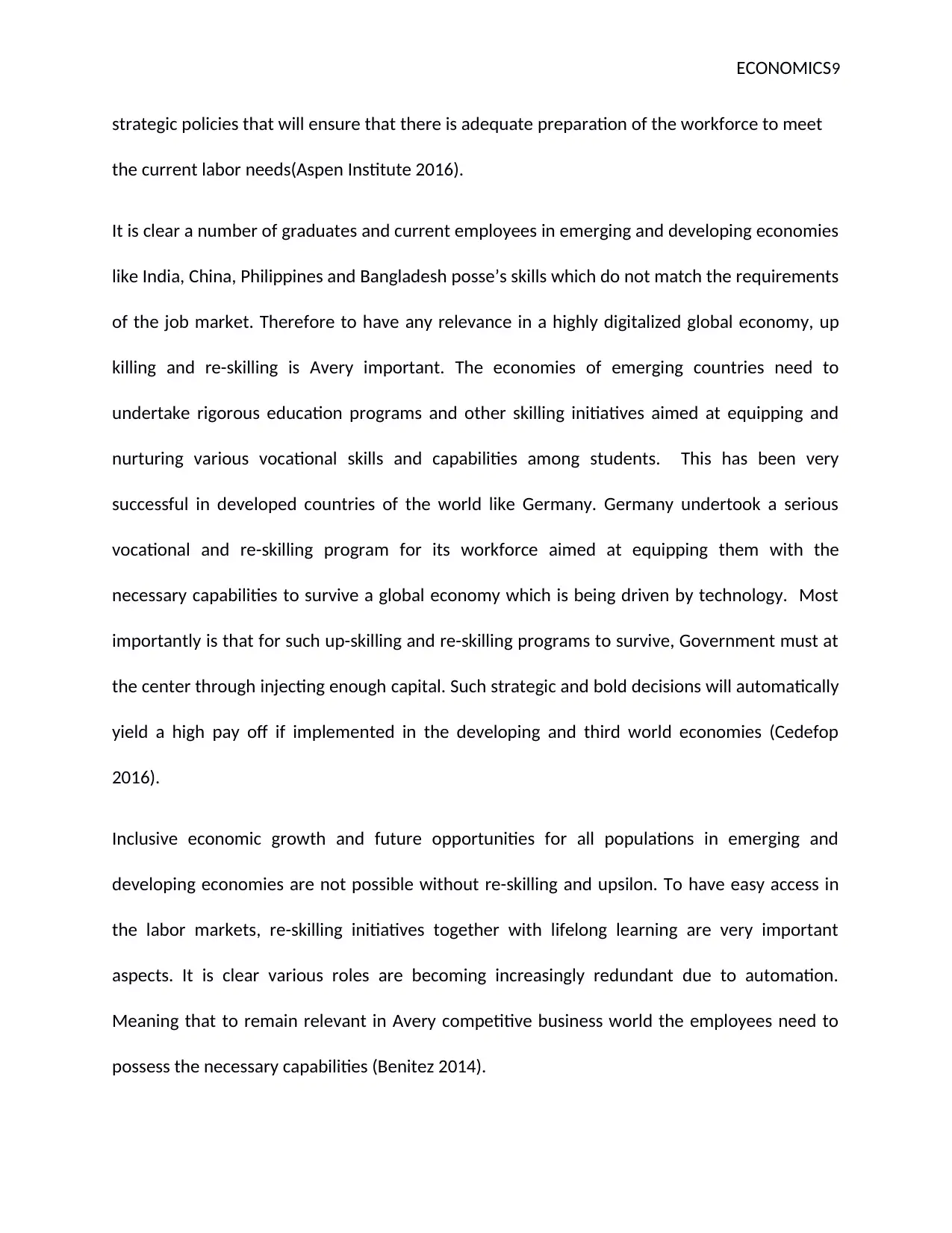
ECONOMICS9
strategic policies that will ensure that there is adequate preparation of the workforce to meet
the current labor needs(Aspen Institute 2016).
It is clear a number of graduates and current employees in emerging and developing economies
like India, China, Philippines and Bangladesh posse’s skills which do not match the requirements
of the job market. Therefore to have any relevance in a highly digitalized global economy, up
killing and re-skilling is Avery important. The economies of emerging countries need to
undertake rigorous education programs and other skilling initiatives aimed at equipping and
nurturing various vocational skills and capabilities among students. This has been very
successful in developed countries of the world like Germany. Germany undertook a serious
vocational and re-skilling program for its workforce aimed at equipping them with the
necessary capabilities to survive a global economy which is being driven by technology. Most
importantly is that for such up-skilling and re-skilling programs to survive, Government must at
the center through injecting enough capital. Such strategic and bold decisions will automatically
yield a high pay off if implemented in the developing and third world economies (Cedefop
2016).
Inclusive economic growth and future opportunities for all populations in emerging and
developing economies are not possible without re-skilling and upsilon. To have easy access in
the labor markets, re-skilling initiatives together with lifelong learning are very important
aspects. It is clear various roles are becoming increasingly redundant due to automation.
Meaning that to remain relevant in Avery competitive business world the employees need to
possess the necessary capabilities (Benitez 2014).
strategic policies that will ensure that there is adequate preparation of the workforce to meet
the current labor needs(Aspen Institute 2016).
It is clear a number of graduates and current employees in emerging and developing economies
like India, China, Philippines and Bangladesh posse’s skills which do not match the requirements
of the job market. Therefore to have any relevance in a highly digitalized global economy, up
killing and re-skilling is Avery important. The economies of emerging countries need to
undertake rigorous education programs and other skilling initiatives aimed at equipping and
nurturing various vocational skills and capabilities among students. This has been very
successful in developed countries of the world like Germany. Germany undertook a serious
vocational and re-skilling program for its workforce aimed at equipping them with the
necessary capabilities to survive a global economy which is being driven by technology. Most
importantly is that for such up-skilling and re-skilling programs to survive, Government must at
the center through injecting enough capital. Such strategic and bold decisions will automatically
yield a high pay off if implemented in the developing and third world economies (Cedefop
2016).
Inclusive economic growth and future opportunities for all populations in emerging and
developing economies are not possible without re-skilling and upsilon. To have easy access in
the labor markets, re-skilling initiatives together with lifelong learning are very important
aspects. It is clear various roles are becoming increasingly redundant due to automation.
Meaning that to remain relevant in Avery competitive business world the employees need to
possess the necessary capabilities (Benitez 2014).
⊘ This is a preview!⊘
Do you want full access?
Subscribe today to unlock all pages.

Trusted by 1+ million students worldwide
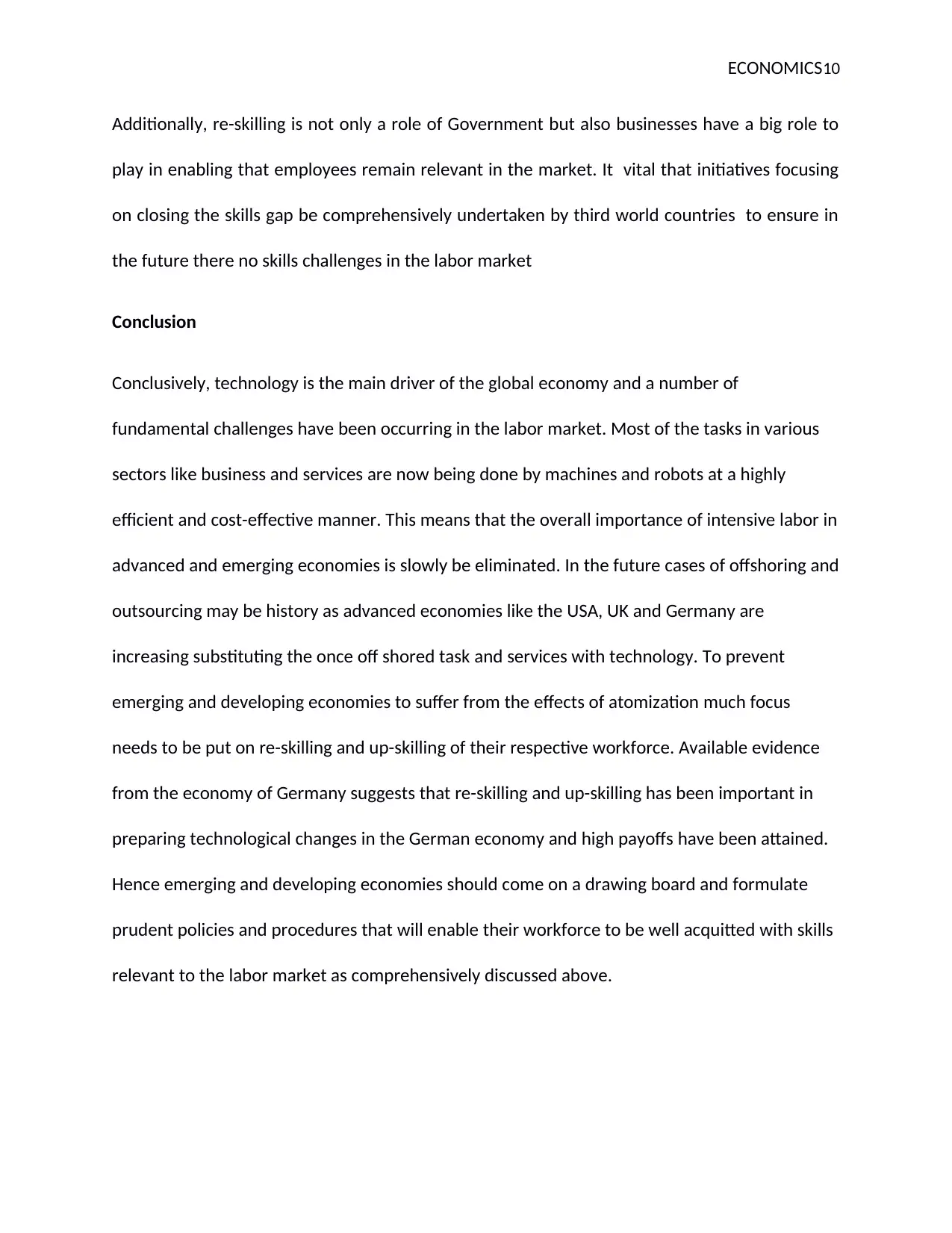
ECONOMICS10
Additionally, re-skilling is not only a role of Government but also businesses have a big role to
play in enabling that employees remain relevant in the market. It vital that initiatives focusing
on closing the skills gap be comprehensively undertaken by third world countries to ensure in
the future there no skills challenges in the labor market
Conclusion
Conclusively, technology is the main driver of the global economy and a number of
fundamental challenges have been occurring in the labor market. Most of the tasks in various
sectors like business and services are now being done by machines and robots at a highly
efficient and cost-effective manner. This means that the overall importance of intensive labor in
advanced and emerging economies is slowly be eliminated. In the future cases of offshoring and
outsourcing may be history as advanced economies like the USA, UK and Germany are
increasing substituting the once off shored task and services with technology. To prevent
emerging and developing economies to suffer from the effects of atomization much focus
needs to be put on re-skilling and up-skilling of their respective workforce. Available evidence
from the economy of Germany suggests that re-skilling and up-skilling has been important in
preparing technological changes in the German economy and high payoffs have been attained.
Hence emerging and developing economies should come on a drawing board and formulate
prudent policies and procedures that will enable their workforce to be well acquitted with skills
relevant to the labor market as comprehensively discussed above.
Additionally, re-skilling is not only a role of Government but also businesses have a big role to
play in enabling that employees remain relevant in the market. It vital that initiatives focusing
on closing the skills gap be comprehensively undertaken by third world countries to ensure in
the future there no skills challenges in the labor market
Conclusion
Conclusively, technology is the main driver of the global economy and a number of
fundamental challenges have been occurring in the labor market. Most of the tasks in various
sectors like business and services are now being done by machines and robots at a highly
efficient and cost-effective manner. This means that the overall importance of intensive labor in
advanced and emerging economies is slowly be eliminated. In the future cases of offshoring and
outsourcing may be history as advanced economies like the USA, UK and Germany are
increasing substituting the once off shored task and services with technology. To prevent
emerging and developing economies to suffer from the effects of atomization much focus
needs to be put on re-skilling and up-skilling of their respective workforce. Available evidence
from the economy of Germany suggests that re-skilling and up-skilling has been important in
preparing technological changes in the German economy and high payoffs have been attained.
Hence emerging and developing economies should come on a drawing board and formulate
prudent policies and procedures that will enable their workforce to be well acquitted with skills
relevant to the labor market as comprehensively discussed above.
Paraphrase This Document
Need a fresh take? Get an instant paraphrase of this document with our AI Paraphraser
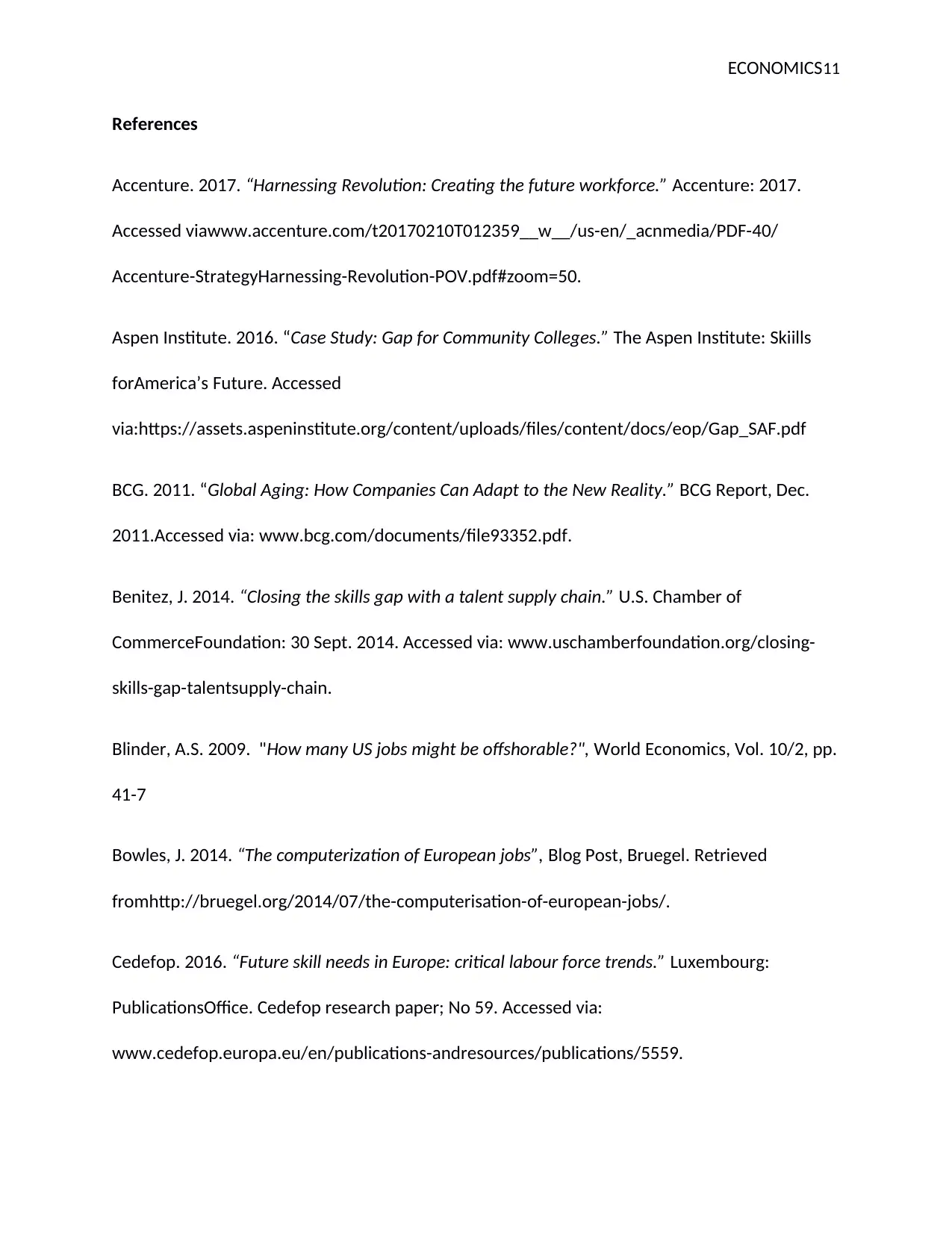
ECONOMICS11
References
Accenture. 2017. “Harnessing Revolution: Creating the future workforce.” Accenture: 2017.
Accessed viawww.accenture.com/t20170210T012359__w__/us-en/_acnmedia/PDF-40/
Accenture-StrategyHarnessing-Revolution-POV.pdf#zoom=50.
Aspen Institute. 2016. “Case Study: Gap for Community Colleges.” The Aspen Institute: Skiills
forAmerica’s Future. Accessed
via:https://assets.aspeninstitute.org/content/uploads/files/content/docs/eop/Gap_SAF.pdf
BCG. 2011. “Global Aging: How Companies Can Adapt to the New Reality.” BCG Report, Dec.
2011.Accessed via: www.bcg.com/documents/file93352.pdf.
Benitez, J. 2014. “Closing the skills gap with a talent supply chain.” U.S. Chamber of
CommerceFoundation: 30 Sept. 2014. Accessed via: www.uschamberfoundation.org/closing-
skills-gap-talentsupply-chain.
Blinder, A.S. 2009. "How many US jobs might be offshorable?", World Economics, Vol. 10/2, pp.
41-7
Bowles, J. 2014. “The computerization of European jobs”, Blog Post, Bruegel. Retrieved
fromhttp://bruegel.org/2014/07/the-computerisation-of-european-jobs/.
Cedefop. 2016. “Future skill needs in Europe: critical labour force trends.” Luxembourg:
PublicationsOffice. Cedefop research paper; No 59. Accessed via:
www.cedefop.europa.eu/en/publications-andresources/publications/5559.
References
Accenture. 2017. “Harnessing Revolution: Creating the future workforce.” Accenture: 2017.
Accessed viawww.accenture.com/t20170210T012359__w__/us-en/_acnmedia/PDF-40/
Accenture-StrategyHarnessing-Revolution-POV.pdf#zoom=50.
Aspen Institute. 2016. “Case Study: Gap for Community Colleges.” The Aspen Institute: Skiills
forAmerica’s Future. Accessed
via:https://assets.aspeninstitute.org/content/uploads/files/content/docs/eop/Gap_SAF.pdf
BCG. 2011. “Global Aging: How Companies Can Adapt to the New Reality.” BCG Report, Dec.
2011.Accessed via: www.bcg.com/documents/file93352.pdf.
Benitez, J. 2014. “Closing the skills gap with a talent supply chain.” U.S. Chamber of
CommerceFoundation: 30 Sept. 2014. Accessed via: www.uschamberfoundation.org/closing-
skills-gap-talentsupply-chain.
Blinder, A.S. 2009. "How many US jobs might be offshorable?", World Economics, Vol. 10/2, pp.
41-7
Bowles, J. 2014. “The computerization of European jobs”, Blog Post, Bruegel. Retrieved
fromhttp://bruegel.org/2014/07/the-computerisation-of-european-jobs/.
Cedefop. 2016. “Future skill needs in Europe: critical labour force trends.” Luxembourg:
PublicationsOffice. Cedefop research paper; No 59. Accessed via:
www.cedefop.europa.eu/en/publications-andresources/publications/5559.
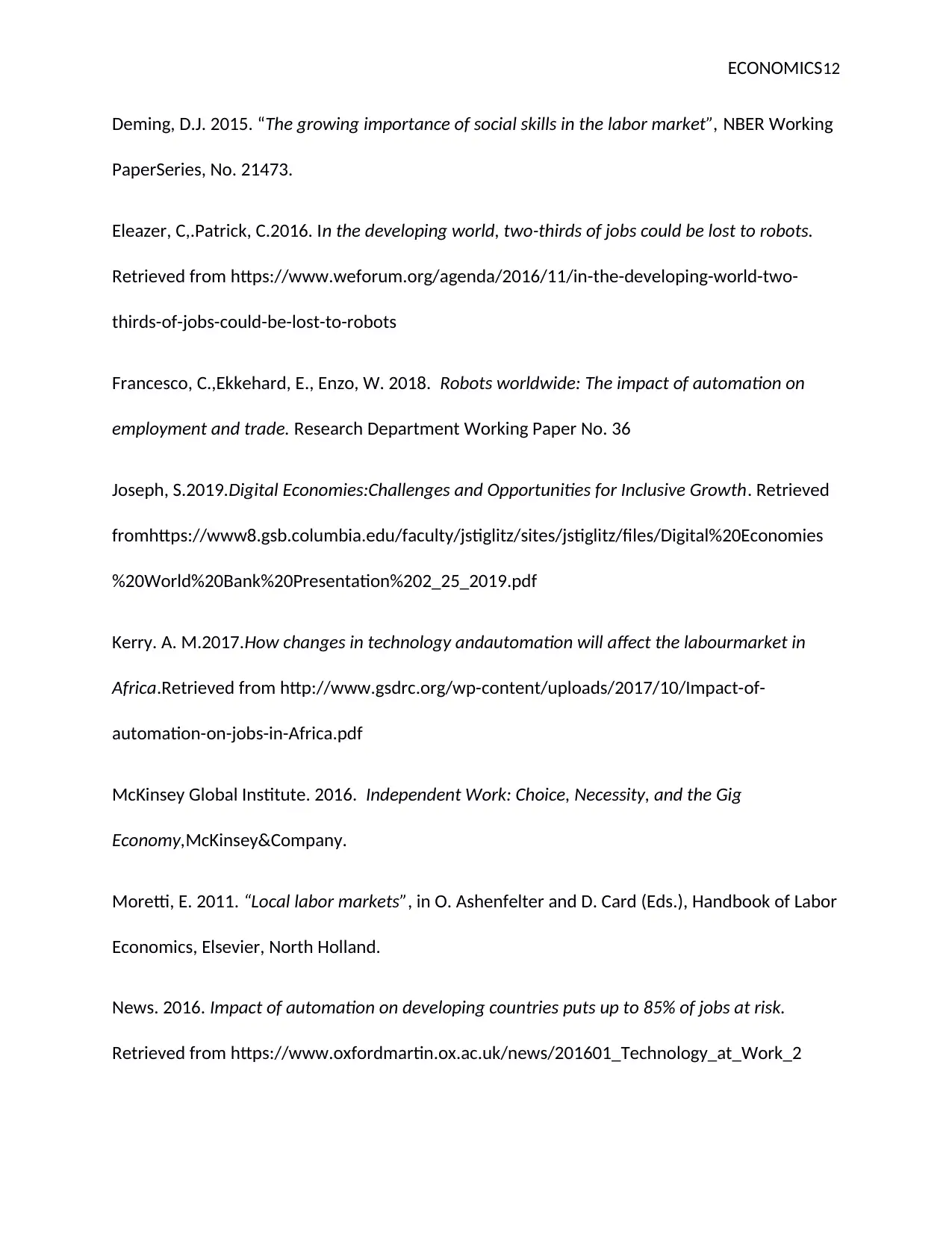
ECONOMICS12
Deming, D.J. 2015. “The growing importance of social skills in the labor market”, NBER Working
PaperSeries, No. 21473.
Eleazer, C,.Patrick, C.2016. In the developing world, two-thirds of jobs could be lost to robots.
Retrieved from https://www.weforum.org/agenda/2016/11/in-the-developing-world-two-
thirds-of-jobs-could-be-lost-to-robots
Francesco, C.,Ekkehard, E., Enzo, W. 2018. Robots worldwide: The impact of automation on
employment and trade. Research Department Working Paper No. 36
Joseph, S.2019.Digital Economies:Challenges and Opportunities for Inclusive Growth. Retrieved
fromhttps://www8.gsb.columbia.edu/faculty/jstiglitz/sites/jstiglitz/files/Digital%20Economies
%20World%20Bank%20Presentation%202_25_2019.pdf
Kerry. A. M.2017.How changes in technology andautomation will affect the labourmarket in
Africa.Retrieved from http://www.gsdrc.org/wp-content/uploads/2017/10/Impact-of-
automation-on-jobs-in-Africa.pdf
McKinsey Global Institute. 2016. Independent Work: Choice, Necessity, and the Gig
Economy,McKinsey&Company.
Moretti, E. 2011. “Local labor markets”, in O. Ashenfelter and D. Card (Eds.), Handbook of Labor
Economics, Elsevier, North Holland.
News. 2016. Impact of automation on developing countries puts up to 85% of jobs at risk.
Retrieved from https://www.oxfordmartin.ox.ac.uk/news/201601_Technology_at_Work_2
Deming, D.J. 2015. “The growing importance of social skills in the labor market”, NBER Working
PaperSeries, No. 21473.
Eleazer, C,.Patrick, C.2016. In the developing world, two-thirds of jobs could be lost to robots.
Retrieved from https://www.weforum.org/agenda/2016/11/in-the-developing-world-two-
thirds-of-jobs-could-be-lost-to-robots
Francesco, C.,Ekkehard, E., Enzo, W. 2018. Robots worldwide: The impact of automation on
employment and trade. Research Department Working Paper No. 36
Joseph, S.2019.Digital Economies:Challenges and Opportunities for Inclusive Growth. Retrieved
fromhttps://www8.gsb.columbia.edu/faculty/jstiglitz/sites/jstiglitz/files/Digital%20Economies
%20World%20Bank%20Presentation%202_25_2019.pdf
Kerry. A. M.2017.How changes in technology andautomation will affect the labourmarket in
Africa.Retrieved from http://www.gsdrc.org/wp-content/uploads/2017/10/Impact-of-
automation-on-jobs-in-Africa.pdf
McKinsey Global Institute. 2016. Independent Work: Choice, Necessity, and the Gig
Economy,McKinsey&Company.
Moretti, E. 2011. “Local labor markets”, in O. Ashenfelter and D. Card (Eds.), Handbook of Labor
Economics, Elsevier, North Holland.
News. 2016. Impact of automation on developing countries puts up to 85% of jobs at risk.
Retrieved from https://www.oxfordmartin.ox.ac.uk/news/201601_Technology_at_Work_2
⊘ This is a preview!⊘
Do you want full access?
Subscribe today to unlock all pages.

Trusted by 1+ million students worldwide
1 out of 13
Related Documents
Your All-in-One AI-Powered Toolkit for Academic Success.
+13062052269
info@desklib.com
Available 24*7 on WhatsApp / Email
![[object Object]](/_next/static/media/star-bottom.7253800d.svg)
Unlock your academic potential
Copyright © 2020–2026 A2Z Services. All Rights Reserved. Developed and managed by ZUCOL.





